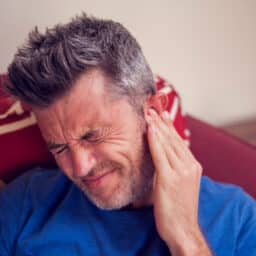How Do I Manage My Tinnitus While I’m at Work?

According to the U.S. Centers for Disease Control and Prevention (CDC), about 8% of all workers in the United States have tinnitus. If you’re one of them, you’re keenly aware of how tinnitus can impede your workday. Tinnitus is a neurological condition in which you hear a sound in your ear with no physical source….
Is Tinnitus Worse at Night? How Can I Manage It?

Tinnitus is the perception of ringing, buzzing, hissing or other sounds in the ears when no actual sound is present and it has affected nearly 10% of American adults. Tinnitus can be disruptive to daily life and can have a negative impact on mental health. For many, the symptoms may become especially noticeable at night….
How Altitude Impacts Ear Pressure and Tinnitus

Changes in altitude can impact the ears and for those with tinnitus, these shifts can sometimes intensify the symptoms they already experience. Consider the following when traveling or participating in other activities in heightened elevation that could impact ear pressure. The Inner Ear and Pressure The inner ear plays an important role in hearing and…
Winter Care Tips for Your Hearing Aids

Winter brings with it a unique set of challenges for those with hearing loss. If you’re one of the 28.8 million U.S. adults who rely on hearing aids, you know how important it is to keep them functioning. Cold temperatures, snow and moisture can all pose threats to the performance of your devices. Let’s look…
How To Effectively Communicate with Those Who Don’t Know You Have Hearing Loss

Living with hearing loss introduces unique challenges, particularly when engaging with individuals who don’t share the same experience. While it isn’t a problem, the importance of effective communication becomes evident in emergencies or critical situations. Being open about your hearing loss can empower others to offer better assistance when needed. Clear Communication Strategies In emergency…
What To Know About Musician’s Monitors For Hearing Protection

Professional musicians are nearly four times more likely to develop noise-induced hearing loss (NIHL) compared to the general public. This condition is common among 18% of adults aged 18-69 who have been exposed to loud noises at work for over five years. Therefore, it’s crucial to understand how hearing damage can occur and the preventative…
Pulsatile Tinnitus: Understanding and Managing the Symptoms

If you’ve ever gone for a run or hike on Winsor Trail, you are likely familiar with the sensation of hearing your heartbeat in your ears. Pulsatile tinnitus causes a similar heartbeat sound in the ears. However, with pulsatile tinnitus, the sound may arise anytime rather than solely after exercise or exertion. Let’s look at…
What Is the Link Between Hearing Loss and Iron Deficiency?

One in eight people in the U.S., aged 12 or older, has hearing loss based on standard hearing examinations. Approximately 15% of adults in the U.S. aged 18 or older report experiencing some degree of hearing trouble. Researchers are continually searching for keys to better understanding hearing loss, and recent research shows iron deficiency anemia,…
How To Manage Tinnitus While Flying

Many things can worsen tinnitus symptoms, including flying. Let’s examine why air travel can be hard for tinnitus sufferers as well as steps you can take to help minimize your symptoms next time you travel. What is Tinnitus? Tinnitus is often described as a ringing in one or both ears. However, some people hear clicking,…
How Is Traffic Noise Linked to Tinnitus?

Tinnitus is a buzzing, clicking or ringing noise in your ears. Tinnitus affects everyone differently, but it can lead to stress, fatigue, anxiety, headaches and more. Many things can contribute to the development of tinnitus. Recently, research has found a link between traffic noise and tinnitus. Tinnitus Risk Increases with Noise Levels Although anyone can…
